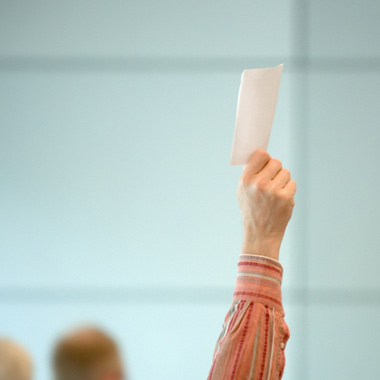BLOG
Spring is typically the time of year when condominium associations hold their annual meetings and elections. While many areas of the Condominium Act defer to association’s governing documents, the laws governing the board member election process are black and white and must be strictly adhered to. It is imperative that an association follow the election process exactly as it is detailed in the statute in order to avoid the possibility that the entire election be invalidated after a challenge.
Of course, the process begins with the proper notices. The first notice of the annual meeting and election must be distributed to the owners no later than 60 days prior to the date of the annual meeting and election, and the second notice must be sent out no later than 14 days prior to. Failure to adhere to these deadlines could render the election invalid. The notices must include the annual meeting date, time and location. The first notice must also provide the deadlines for owners to submit their notices of intent run for the board. An owner desiring to be a candidate for the board must submit their notice of intent 40 days prior to the election, failing which, their name cannot be included on the ballot. For those owners who submit notices of intent to be a candidate, the statute provides that they may submit a resume at least 35 days before the scheduled election.
For the election itself, the process detailed in the statute is exceedingly clear. In order to maintain the owners’ right to privacy, the owners should place their actual ballots sealed inside of an inner envelope that is marked “Ballot Only.” That inner envelope should then be placed into an outer envelope that has the owner’s name, unit number and signature.
 In order to have the election (i.e., open and count the ballots), at least 20 percent of the membership has to cast a ballot. After counting the envelopes cast and verifying that the 20 percent threshold has been met, volunteer members who are not related to anyone running for the board should be appointed to open the envelopes and count the votes. These volunteers should first open the outer envelopes and separate inner “Ballot” envelopes. Then the inner envelopes should be opened and separated from the ballots before counting the votes. It is actually not a problem if there is no inner envelope, as owners are allowed to waive their right to privacy for their vote. However, the outer envelope with the name, unit number and signature is absolutely imperative or the ballot cannot be accepted.
In order to have the election (i.e., open and count the ballots), at least 20 percent of the membership has to cast a ballot. After counting the envelopes cast and verifying that the 20 percent threshold has been met, volunteer members who are not related to anyone running for the board should be appointed to open the envelopes and count the votes. These volunteers should first open the outer envelopes and separate inner “Ballot” envelopes. Then the inner envelopes should be opened and separated from the ballots before counting the votes. It is actually not a problem if there is no inner envelope, as owners are allowed to waive their right to privacy for their vote. However, the outer envelope with the name, unit number and signature is absolutely imperative or the ballot cannot be accepted.
It is generally recommended by most experienced community association legal counsel to have the association’s attorney attend the annual meeting to verify that every facet of the election process is followed to the letter. For condominium associations that may not have their attorney attend any other board meeting through the course of the typical year, they would be well advised to have their attorney attend and certify the annual meeting and election. Also, keep in mind that new board members are now required by the State of Florida to attend an approved board member certification course or submit written verification to the association secretary within 90 days of being elected or appointed. Our firm regularly conducts complimentary Board Member Certification seminars and webinars, and we encourage new board members to contact us or visit our firm website for more information or to RSVP.

